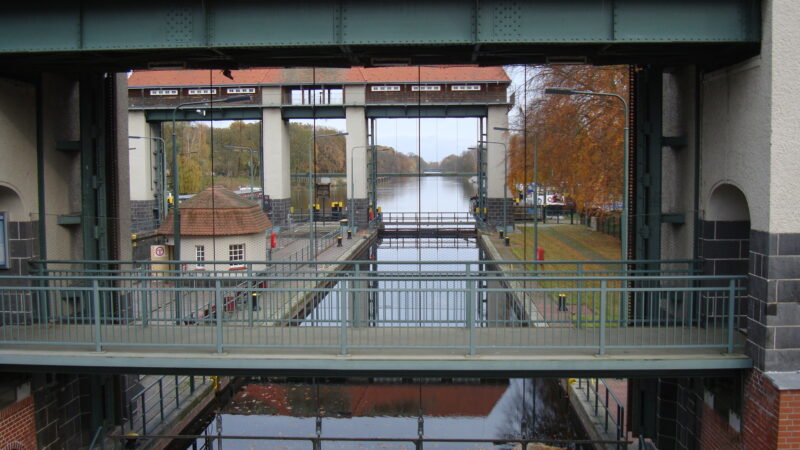Borders on the ground, borders in people’s heads

Yesterday was a public holiday in Berlin and I took a little cycle trip along the Teltowcanal all the way to the small town Kleinmachnow, sandwiched between Zehlendorf and Potsdam, south west of Berlin. The canal itself was partly the border between East and West Germany, and East and West Berlin, and that border is still the border between the German Länder of Berlin and Brandenburg. Long before you get there you cross another border – between the Berlin Bezirke of Tempelhof-Schöneberg and Steglitz-Zehlendorf – where the quality of the cycle path suddenly changes. The Bezirke could of course have collaborated to improve the cycle path, but politics is politics and these sorts of collaborative solutions are often hard. Further on, heading north from Kleinmachnow north back into Berlin, there is a whole area where the border, even now 30 years on from the fall of the wall, lacks paths or roads to cross it.
The essential point is this: even now, we cannot completely erase these borders. They are inevitable. Even if people cross them without thinking about it, the policies in place on either side are different.
And so we come to the border issue of the moment – opening or closing borders as Coronavirus restrictions ease.
Restricting people’s movement made obvious sense as a means to control the virus. China locked down Wuhan, Italy locked down Lombardia before extending that to the rest of the country, Germany restricted movement in and out of Heinsberg before rolling out restrictions to the rest its territory, and easing of restrictions is being done in Germany by Land and even by Kreis. But most notably whole countries re-imposed border controls – stopping citizens of European countries from entering other ones.
Did this make any more sense in health terms than, say, restricting movement in and out of Heinsberg? No, probably not, but there is the availability heuristic – you do what you can and what is available to you. And healthcare policy remains a national competence in the EU – if my neighbouring country has a health issue, a healthcare system that cannot cope, or a population that does not respect lockdown, then the automatic reaction to want to stop those people coming over the border.
Plus closing borders in the EU, when France has had what has become almost a permanent Schengen exemption for more than 5 years for terrorism reasons, and Austria, Germany, Denmark, Sweden and Norway have had a Schengen suspension since 2015 due to the refugee crisis, is a lot easier now than it would have been had Coronavirus happened in 2014. That Macron is the one appealing for European solutions here strikes me as rather hypocritical, given that his heavy handed response to terrorist threats, and the state of emergency in France, was the very thing that damaged Schengen so much in the first place.
Solving these sorts of problems – the Tempelhof-Schöneberg to Steglitz-Zehlendorf bike path problem writ large – requires massive political collaboration, the scale of which on healthcare matters in Europe we have never seen until now, and even now how well it will function is questionable. Removing border controls in Schengen only worked because of the Schengen Information System, allowing police forces to share data on cross border crime – if a criminal crosses the border because there is no border control, so too can the police force to pursue that person, or the data can cross to allow the local police force to pursue the criminal further. So too must be the case in future for health matters – while individual countries might have adequate virus tracking mechanisms, these do not work cross border currently (we see with the Google and Apple APIs for contact tracing how this might work in future).
Whether we like it or not some restriction on freedom of movement is inevitable in future – for health or for security reasons. The default must be that there is as much freedom to move as possible, and for all citizens, not just those who are privileged enough to find ways around the controls (and if you doubt this, do have a read of some of my old posts about Schengen). And the quid pro quo for that will also need to be better data systems – to allow cross border disease tracking. And if strict movement control is needed (as was the case with Coronavirus), this needs to be done according to need and in a manner as geographically restricted as possible, and not just with recourse to national borders (because that is what our policymakers have in their heads).